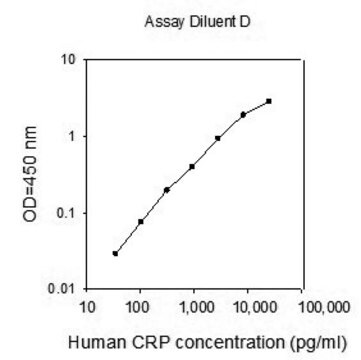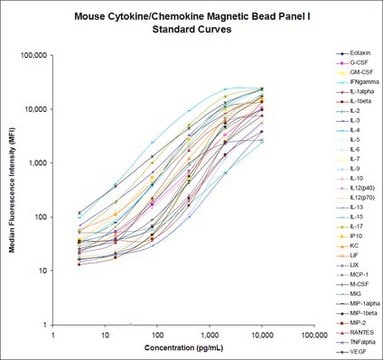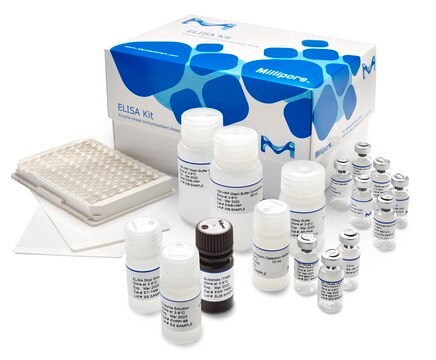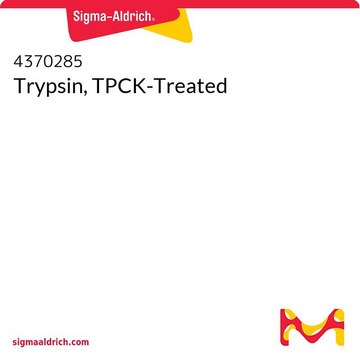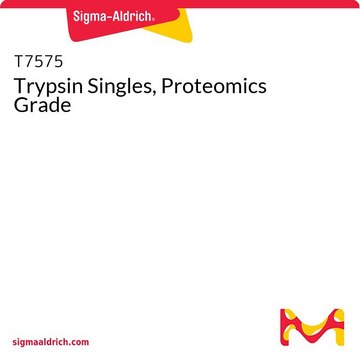4352135
iTRAQ® Reagents Multiplex Kit
Synonym(s):
isobaric tags for relative and absolute quantitation
Sign Into View Organizational & Contract Pricing
All Photos(1)
About This Item
UNSPSC Code:
12161503
NACRES:
NA.24
Recommended Products
shipped in
dry ice
storage temp.
−20°C
General description
Contains iTRAQ® reagents 114, 115, 116, 117, the appropriate buffers and reagents for ten 2-plex, six 3-plex, or five 4-plex assays. 10-PK trypsin is sold separately. Each individual reagent is capable of labeling up to 100 μg of protein.
Application
The iTRAQ® Reagents Multiplex Kit provides iTRAQ® reagents and protocol to label peptides after digestion. This widely used generic labeling kit can be used for virtually any workflow.
iTRAQ® Reagents Multiplex Kit has been used for the labeling of peptides for LC-MS (liquid chromatography–mass spectrometry)/MS analysis.
iTRAQ® Reagents Multiplex Kit has been used for the labeling of peptides for LC-MS (liquid chromatography–mass spectrometry)/MS analysis.
Analysis Note
To view the general Protocol for iTRAQ Reagents, please visit this Protocol link.
To view the Chemistry Quick Reference Card for the iTRAQ Reagents, please visit this Chemistry Quick Reference Card link.
The Certificate of Analysis (CofA) for your specific lot is accessible by entering the product number and lot number at this CofA access link.
To view the Chemistry Quick Reference Card for the iTRAQ Reagents, please visit this Chemistry Quick Reference Card link.
The Certificate of Analysis (CofA) for your specific lot is accessible by entering the product number and lot number at this CofA access link.
Legal Information
iTraq is a registered trademark of AB Sciex Pte. Ltd.
signalword
Danger
Hazard Classifications
Acute Tox. 4 Dermal - Acute Tox. 4 Inhalation - Acute Tox. 4 Oral - Eye Irrit. 2 - Flam. Liq. 2 - Skin Irrit. 2 - STOT SE 3
target_organs
Central nervous system
Storage Class
3 - Flammable liquids
flash_point_f
35.6 °F - closed cup
flash_point_c
2.0 °C - closed cup
Certificates of Analysis (COA)
Search for Certificates of Analysis (COA) by entering the products Lot/Batch Number. Lot and Batch Numbers can be found on a product’s label following the words ‘Lot’ or ‘Batch’.
Already Own This Product?
Find documentation for the products that you have recently purchased in the Document Library.
Customers Also Viewed
Sonia Osorio et al.
Plant physiology, 157(1), 405-425 (2011-07-29)
Tomato (Solanum lycopersicum) is an established model to study fleshy fruit development and ripening. Tomato ripening is regulated independently and cooperatively by ethylene and transcription factors, including nonripening (NOR) and ripening-inhibitor (RIN). Mutations of NOR, RIN, and the ethylene receptor
Quantitative proteomic approach to study subcellular localization of membrane proteins.
Sadowski PG, et al.
Nature Protocols, 1, 1778-1789 (2006)
Izhak Michaelevski et al.
Molecular & cellular proteomics : MCP, 9(5), 976-987 (2009-12-04)
Investigations of the molecular mechanisms underlying responses to nerve injury have highlighted the importance of axonal transport systems. To obtain a comprehensive view of the protein ensembles associated with axonal transport in injured axons, we analyzed the protein compositions of
Emilie Ernoult et al.
Proteome science, 6, 27-27 (2008-10-15)
The development of mass spectrometric techniques and fractionation methods now allows the investigation of very complex protein mixtures ranging from subcellular structures to tissues. Nevertheless, this work is particularly difficult due to the wide dynamic range of protein concentration in
Comparative Analysis of Secretome Profiles of Manganese(II)-Oxidizing Ascomycete Fungi.
Zeiner CA, et al.
PLoS ONE, 11, e0157844-e0157844 (2016)
Our team of scientists has experience in all areas of research including Life Science, Material Science, Chemical Synthesis, Chromatography, Analytical and many others.
Contact Technical Service


